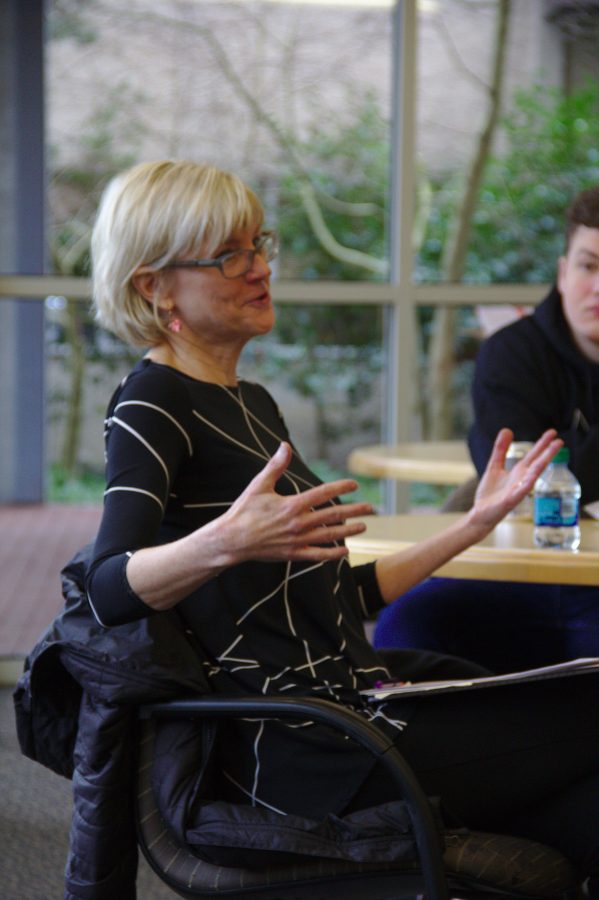News and Nachos predicts outcome of Brexit
The Brexit final deadline is nearly a month away, which means that British politicians are facing a weighty decision: to advocate for the withdrawing of Britain from the European Union, or oppose it.
As the cutoff date draws nearer, more uneasiness grows for both supporters and non-supporters of the decision. Four thousand miles away, Seattle Pacific University’s History Club examined the matter, and is watching for Britain’s next move.
On Thursday, Feb. 14, the News and Nachos discussion series held its second session. This discussion focused on the context of the United Kingdom’s ongoing political issue, Brexit.
Dr. Rebecca Hughes, associate professor of European history at SPU, shed light on the reasons behind the creation of this policy proposal while those listening enjoyed tortilla chips and mild salsa.
With a cheery persona and professional eloquence, she discussed the history of the U.K. in terms of its relationship to the EU and explained that Brexit is a matter based on foreign immigration. Ultimately, the nation is under both domestic and foreign scrutiny, and chaos is bound to occur due to such extreme opinions leaning both ways on the issue.
“The lessons of history that we can learn from this unfolding drama are that we need to address the realities that not everyone is benefiting from globalization,” Hughes said in an email to The Falcon.
Britain’s current prime minister, Theresa May, has recently had parliament support gradually decline for her proposal of British exit from the EU. Set into motion by a referendum held in June 2016, Britain is set to leave the EU on March 29, 2019.
This change, according to some news sites such as CNBC, can be cancelled or reversed, but this would be extremely complicated and would include repealing Article 50. Many around the world expect the British government to attempt this, including some who attended the News and Nachos meeting.
One attendee, Emma Robbins, a senior and history major at SPU, said she gained more understanding about Brexit at the session.
“I knew from hearing about Brexit in the news that it is highly controversial, but I didn’t understand why,” Robbins said in an email to The Falcon. “The SPU community should care about Brexit because the decision does not just affect Europe. ”
Most who attended the meeting had little or no prior knowledge about the Brexit issue. First-year Cambria Bennett, also a history major, said that after the talk, she was able to see the foreign matter as an ongoing issue.
“There is divide within on how to approach this break,” Bennett said in the email.
“Whether it be completely cutting ties with the EU and suffering harsh economic consequences or a softer break, still keeping some connection but having more control over their borders and trade.”
To help listeners understand the complexity of the issue, Hughes first briefed the students and faculty in attendance about the history of the EU, then taught about the U.K. and its journey to membership in the EU.
“Up to World War II, for the most part besides the increasing power of the United States, Britain had been the most powerful country in the world,” Hughes said.
But after the Second World War, much rebuilding had to be done, and the British Nationality Act was passed to allow people in British colonies to become national citizens of the United Kingdom. They recruited many skilled workers from places as far as Jamaica. Later on, decolonization and racial tensions complicated this source of labor
“So where do they turn?” Hughes asked. “To Europe.”
Britain petitioned to join the European Economic Community, a precursor to the EU, in search of European workers. In 1973, Britain was afforded membership, but opted out of using the euro, and instead kept the British pound.
“Britain has been a leader in finance and insurance, so they very much want to keep their British pound,” Hughes said.
Later, in the 90s, economic growth was present again, though the currency remained different from the rest of Europe.
Due to the rising economy, more workers flooded into the country from EU members, and by the 2000s, many foreign people such as Poles and Ukrainians were employed in Britain. In addition to the influx of workers, war refugees from Syria, migrators escaping droughts, and other immigrants from Middle Eastern countries began migrating to the EU, namely Italy and Greece, and eventually France and the U.K.
“We see concerns about national identity,” Hughes said.
After World War II, many countries in the EU wanted to, according to Hughes, “curtail immigration.” The influx of immigrants was not favored, and many nations wished to keep their borders strict.
Britain was one of these countries.
Due to rising concern of national identity, the current British prime minister, May, began holding referendums in favor of withdrawing from the EU, after parliament rejected what is known as her “soft Brexit” proposal.
The “soft” Brexit would involve another referendum, and if the exit was successful, open borders with nearby countries still part of the EU. A “hard” Brexit would involve no referendums and no ease into independence from the EU.
“There are very legitimate concerns about what this is going to cost Britain economically,” Hughes said. “Theresa May is trying to gather more support for her policy.”
Hughes asked listeners to discuss amongst themselves the fairness of referendums as well as the potential outcomes of Brexit. One takeaway that she would like the SPU community to gain from watching Brexit unfold would be “to help build bridges between different communities,” rather than allowing white nationalism to suppress minorities.
“A significant population feels marginalized by globalization and faces rising inequality,” Hughes said. “Racism and xenophobia must be addressed, and unfortunately, many politicians use the politics of fear to gain power.”

















































































